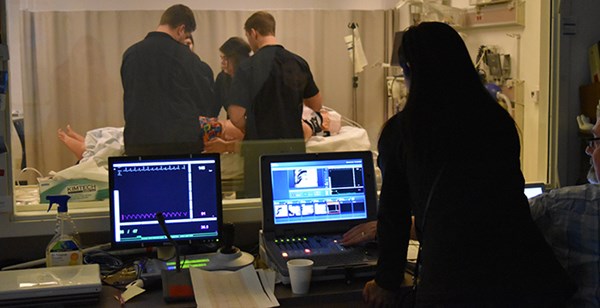"Doctor, the patient is unresponsive!" You look up at the monitor and the rhythm strip becomes an all-too-familiar sinusoidal wave. Immediately, the medical student rushes to slap on pads. “O2 sat is 72%!” shouts a student at the head of the table. “2 minutes remaining,” blares the intercom. The audience looks on”¦
Luckily, this is not a hospital. In fact, the patient is not a patient at all, but rather a technologically advanced, wireless human patient mannequin equipped with palpable pulses, realistic chest rise, functional eyelids, and a voice box that allow learners to fully interact with this all-too-real patient.
Long gone are the days when medical education consisted purely of students submerged in piles of medical books without a single patient encounter. In an era when 500 page textbooks have been replaced by 50 megabytes on the cloud, technological advances challenge the medical curriculum by providing high fidelity, low stakes learning in the form of simulation. In the preclinical curriculum, this is exemplified by subjects that require early clinical context, including doctoring, objective structured clinical examination (OSCEs), and certifications such as Basic Life Support (BLS) or Advanced Cardiovascular Life Support (ACLS). Medical students are now using medical simulation as an adjunctive tool to assess, learn, and actively participate in rare or emergent clinical situations while incorporating team-based competition and camaraderie. Simulation's accessibility increasingly allows students to be advocates of their own learning, facilitating clinical exposure that permeates the preclinical curriculum.
The Texas College of Emergency Physicians (TCEP) hosted the 2nd Annual Emergency Medicine Simulation Competition, otherwise known as “SIM Wars,” on April 1 in Grapevine, Texas. The TCEP Sim Wars creators recognize the importance of simulation-based training, not only for students interested in emergency medicine, but for anyone within the health care field. “We have the chance to immediately apply what we learn in lecture to medical cases in the simulation center. What results is an enhanced learning experience that encourages improved communication, teamwork, and confidence in our abilities. Ultimately, what we learn here is going to translate to better patient care in the future,” said first-year McGovern Medical School student John Peacock.
In this simulation challenge, each team had 8 minutes to complete a medical scenario in a simulated emergency department with access to vital sign monitoring, medical laboratory analysis, radiological imaging, and medical/procedural-based interventions. Teams were required to use their skills and judgment to assess the situation, make a quick diagnosis, and provide the appropriate treatment on a simulated patient. A physician panel judged each team on their quality of medical treatment, teamwork, and communication skills to determine the winner.
This year's TCEP SIM Wars winner, UTHealth McGovern Medical School (Houston), is relatively new to the world of medical simulation. The team consists of first-year students in the EMIG: Rishi Goel, Grace Guvernator, Joseph Moffitt, John Peacock, and Joseph Ponce, with fourth-year student coaches Shane Appel and Alexander Smith. Medical simulation in the McGovern Medical School EMIG is entirely student-led and functions as a small group. Each meeting consists of a 30-minute preview of a specified topic, a 20-minute hands-on simulated training session, and a 10-minute debrief.
With the support of school administration and key faculty mentors, the team plans to create an official organization that provides the infrastructure for students to enhance their medical education through simulation-based training. “We are currently taking the necessary steps to gather the faculty and financial support needed to create an official Simulation In Medicine (SIM) student group,” said first-year medical student Joseph Ponce. “Shane and Alexander have provided an excellent foundation for us to start with. It is my job to build on their vision and create an organization that encompasses not only emergency medicine simulation, but also surgical skills, anesthesiology, and even other specialties like OB/GYN. The bottom line is that we want to get students access to high-fidelity medical simulation earlier and more frequently than ever before because we believe it will make us better physicians in the future.”
Medical simulation not only provides excellent preparation for future clinical rotations and real patient care, but also provides an immediate benefit by integrating and solidifying the pre-clinical concepts and skills students learn in their first half of medical school. “As a first-year medical student, so much time is spent in the classroom and studying for exams as opposed to seeing patients,” Moffitt said. “Simulation provides a context for the concepts learned in the first half of medical school and serves as a reminder that my end goal is treating patients and providing excellent care.”
Experiences gained through medical simulation serve as a framework for making important decisions, such as deciding on a medical specialty. “After participating in simulation and attending the annual TCEP conference, I feel that I have gained so much insight into the field of emergency medicine and I know this is a field in which I can see myself building a life and a career,” Guvernator said. The students at UTHealth McGovern Medical School are passionate about medical simulation and are optimistic about the future of this amazing profession.



